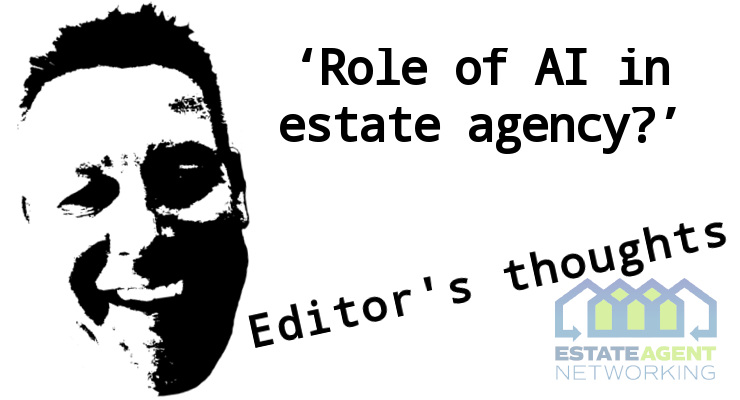Role of AI in estate agency?
Artificial Intelligence is here to stay, we can’t wind back the clock sixty-five-years and stop the advance of AI, the replication of the neural pathways of the human mind in machines. Take a look around: as Amir Husain from Spark Cognition puts it, “Artificial intelligence is kind of the second coming of software.” and its tendrils are everywhere.
AI is deep inside the real estate sector, planning, design, built environment, smart cities, the sale or rental cycle of properties, the management of the built environment in general. AI is composed from a number of components.
Machine learning – processing large amounts of data speedily with algorithms that adapt processes over time and deep learning where data is contextualized, more in depth and with better application, and utilised in a higher manner.
Also, you have the four-horsemen of the digital apocalypse; automated, supporting, expanding and the most feared autonomous intelligence, where machines, not humans, make the ‘best’ decisions.
Now we could say this is terrible, but just a Fintech showed us AI augments what humans can achieve and drives efficiencies which increases profit.
Having spent over three-decades doing the same repetitive sales procedures, the thought of those processes being performed more quickly, more accurately and whilst I’m away doing something more important seems a winner.
In fact due to the legacy-driven, repetitive, and admin-heavy nature of much of the real estate industry, the digitising of the written word plays effortlessly to the strengths of AI.
Take for instance the archaic conveyancing process in the UK, at a seminar given by Taylor Wessing in their London office, it was confirmed that legal documentation that humans would take days to process could now be ‘read’ in minutes by machines. A solution to the present SDLT holiday created bottleneck.
In day-to-day terms – in the customer-led environment, making the customer journey, quicker, easier, and more enjoyable is also a party trick of AI. And the advance in software systems for realtors all over the world gives more time for the sales force to be empathetic and human, closing more business.
Rather than being over-stretched with the sales job and the paperwork. AI gives the commercial edge to real estate business; late adopters will suffer the consequences.
I have many who ask me will technology, specifically AI replace them? I answer, Yes, look at the number of banks that have closed and the huge amounts of staff redundancies, it will not come overnight, but it is an inevitable consequence of progress.
The use of AI in planning design and after maintenance of property is paramount. The management of buildings, via control and sensor systems, allows the structure to be look after itself with minimal human intervention. Waste and loss of construction time can be influenced by removing the human factor, supply chains are more efficient driving cost down.
Recently James Dearsley, Co-Founder of Unissu, has asked if mortgage lending information would be better suited to a fully automated system, given the number-driven, analytical nature of the ever-changing matrix of lenders wanting to provide differing rates for different types of clients?
Many humans thought it unlikely in the short-term, my thoughts were that it is a perfect fit for the on-the-go Generation-Z about to come of age and enter the housing marketplace. They will want mortgage budget figures at 2am, a time most humans will be sleeping.
AI’s intervention in the real estate decision making process will quicken, as more and more data is collated and analysed, sense will be made of this vast amount of data, guiding humans with new answers to questions they had never thought of. This may sound utopian or dystopian, but surely technology is just a tool, that allows the human to exist in their higher form?
Machines not humans can make sense and discern patterns in data that helps us to make the right decision every time. Yes, there will be human bias, and systems are only as good as the data supplied, and there will be a need for standardisation.
But, with technology doubling in its reach annually, rather than on a linear progression, the future looks positive, aided by advances and the cost of tech coming down in real terms. For example in the 1960’s IBM computers sent us to the moon, and the IBM computer of 2020 capacity wise is many thousand times more capable.
AI is built upon mathematics, statistics, probability…hooked up with applications to then perform processes. It is not a thing to be feared, but it does need to be regulated…and follow the ethical codes of humanity
There is of course the flipside to the vast use of data, and AI and the encroachment on the private individual as we saw in Davos 2020, where Professor Harari said that that … “The hashtag#AI revolution might create unprecedented inequality.
We need to take action to distribute the power and the benefits of AI equally between all Humans.”
Taking this thought into the business sector and more specifically real estate, I am not sure the AI revolution creates unprecedented inequality; I just think it is a new prism through which the world order is now being viewed.
I totally feel AI has the power to bring about a balanced and fairer society and it should, but the reality is that commerce and capital runs the show. The disenfranchised and poor are unlikely to fund multi-million-dollar machine learning initiatives; it is commercial organisations doing this.
There is of course a necessary balancing point to the encroachment vs utilisation of AI, will the proficiency of machines come at a cost if they transgress ethical or moral human codes. Could the algorithms set within artificial intelligence be used in corrupt or questionable ways?
What will happen to humanity, hopefully, if the boring mundane sand that clogs up our everyday life is filtered by AI, is we will be able to focus on some bigger problems, joining Professor Harari, saving the planet, looking after those in need of care, it will just take a re-adjustment of some of our own neural pathways to learn different and better ways of doing things.









